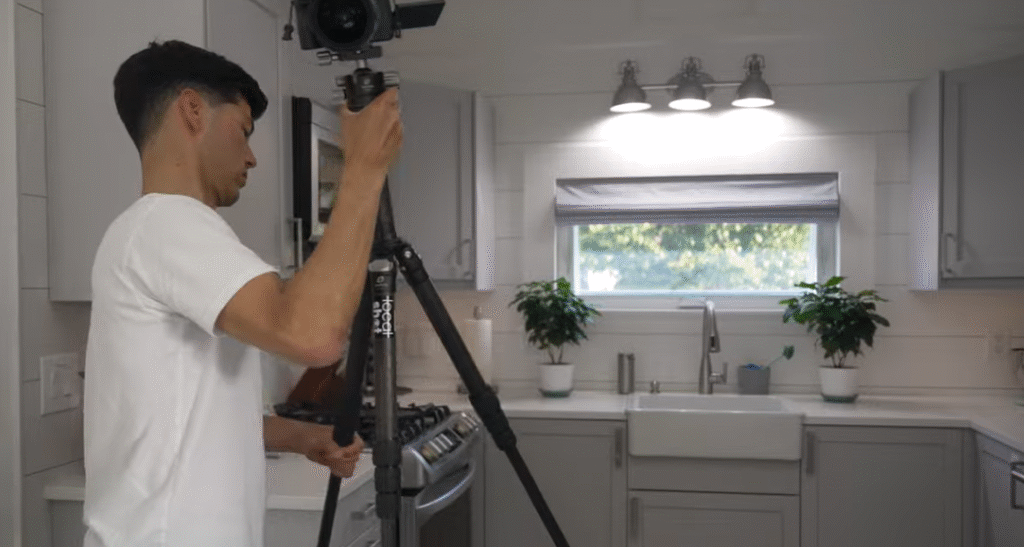When done well, real estate photography has the power to significantly impact a buyer’s initial impression, frequently before they even read the listing description. The demand for professionally taken property photos has significantly increased in the last ten years in the U.S. housing markets. This change is not only aesthetically pleasing; it also significantly improves engagement, click-through rates, and, eventually, closings.
Photographers are capturing imaginations rather than just rooms by utilizing natural light, strategic angles, and minimal staging. High-quality visuals were crucial to many agents’ ability to maintain listing performance during the pandemic, when digital viewings became indispensable. That pattern hasn’t changed. It’s gotten worse, if anything.
Constantly straightening your vertical lines is one of the most useful pieces of advice given by experts like Jonathan Corbett. Unconsciously, a slight tilt in the frame can give the impression that something is off balance. In photography, trust is equal to balance. Tripods are still necessary because of this, not only to guarantee steady alignment but also to enable exposure bracketing without shaking.
When it comes to bracketing, HDR (High Dynamic Range) photography has proven to be especially useful. Photographers can create images with precisely balanced shadows, textures, and bright windows by combining several shots taken at different exposures. The home now looks more genuine and welcoming thanks to this method, which has drastically decreased the need for artificial light.
Profile Table: Featured Industry Expert
| Attribute | Details |
|---|---|
| Name | Jonathan Corbett |
| Profession | Real Estate Photographer & Educator |
| Experience | 12+ Years in Residential and Commercial Photography |
| Location | Los Angeles, California |
| Specialty | Flambient Technique, HDR Bracketing, Drone Photography |
| Notable Work | “How to Photograph a House in 30 Minutes” (47-minute guide on YouTube) |
| Website | Jonathan Corbett Photography |
| Teaching Platforms | YouTube, Skillshare, Private Workshops |
| Equipment Used | Canon R5, Sigma 14mm f/1.8, DJI Mavic Air 2, Lightroom & Photoshop |

One Reddit user provided a useful example: prior to purchasing gimbals or wide-angle lenses, they just concentrated on clearing out their workspace and bringing the tripod down to waist height. Their images seemed less like surveillance footage and more realistic just because of that. Even though these adjustments might not seem like much, taken as a whole, they significantly increase the visual impact.
Wide-angle lenses, namely those with a focal length of 14 to 24 mm, are thought to be very effective at capturing full room arrangements without distortion. These lenses give a more accurate sense of scale by enlarging even the smallest restrooms and hallways. But there’s a crucial warning: stay away from fisheye lenses. Although the curved lines might be visually appealing, they frequently detract rather than enhance.
Customers are increasingly expecting drone footage for homes over $1 million. With its ability to capture stunning aerial views that highlight the home’s exterior, landscaping, and neighborhood proximity, drone photography has grown to be an immensely versatile tool. Frequently used as the “hero shot” on listing platforms, these photos give an air of exclusivity. Drone use in the United States, however, is not a plug-and-play solution because FAA certification is required.
Another important consideration is lighting, both inside and outside. A number of Reddit photographers have highlighted in recent weeks the distinction between mid-day and golden hour photography. While harsh midday light tends to flatten out textures, morning and dusk lighting add depth and warmth. You can produce photographs that are more emotionally impactful by modifying your shoot schedule appropriately.
Never undervalue the importance of interior design. Ironed linens, empty counters, and well-placed throw pillows all contribute to the aspirational ambiance. The case of luxury listings is particularly relevant. Since well-styled spaces result in more scroll-stopping photos, many seasoned photographers are now collaborating with staging experts.
In forums for photographers, the subject of pricing is still hotly contested. Professional packages for homes under 3,000 square feet typically start at $250 to $350. Larger or more expensive properties can legitimately fetch $600 to $1,000 or more, particularly if they include drone work, video tours, or virtual staging. Photographers can better safeguard their time and expertise by basing their rates on deliverables rather than hours.
The photo comes to life during editing. Clean in-camera work is important, but Lightroom or Photoshop are frequently where the magic happens. Standard features include sky replacements, keystone adjustments, exposure correction, and color balance. New technologies, such as AI-assisted platforms (like BoxBrownie and Collov AI), are now speeding up workflows without sacrificing quality, making post-production more efficient and surprisingly inexpensive.
Photography for real estate has subtly changed from being a specialty to being essential. Listings with eye-catching photos not only stand out, but they also take the lead in fast-moving markets like Phoenix, Miami, or Seattle. It has been demonstrated that homes with expert photography sell much more quickly and frequently for higher asking prices. The distinction is strategic rather than merely aesthetic.
Real estate photographers are increasingly playing a key role in a home’s marketing success through strategic alliances with agencies. The partnership is now more cooperative. Photographers create atmosphere; agents give access. When executed properly, the synergy results in increased close rates and improved reputations for both parties.
The industry has seen a surge in new talent over the last five years. Due to real estate’s consistency and creative potential, many people are switching from commercial or wedding work. This is a positive trend. The learning curve has been made manageable by workshops, forums, and YouTube educators, particularly for individuals who are already familiar with light and composition.
Real estate photographers are influencing how properties are viewed online by combining cutting-edge shooting methods, staging to tell a story, and contemporary editing tools. They sell more than just houses; they sell futures. And that advantage is priceless in a cutthroat market.

